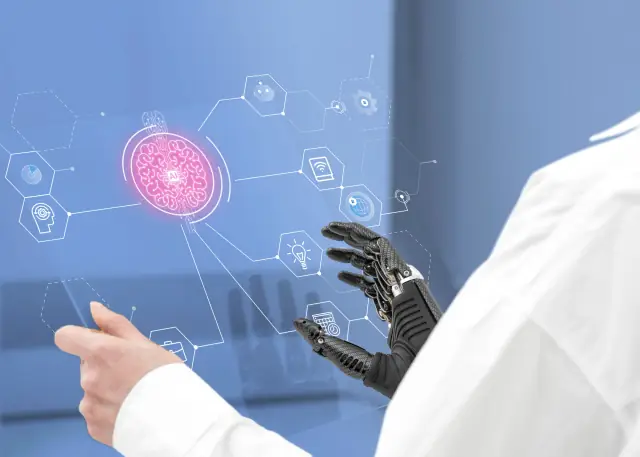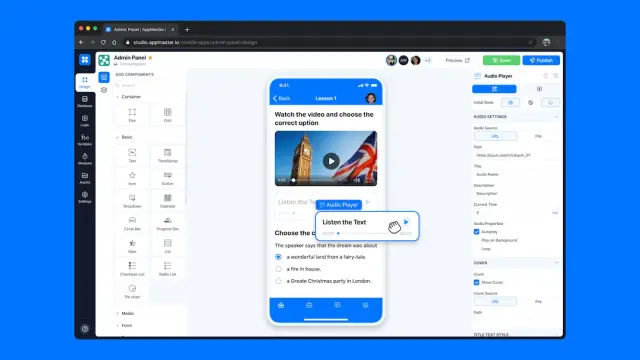No-Code AI in Education: A New Learning Curve
Explore the impact of no-code AI platforms on education, empowering educators and students to create learning tools and resources without coding expertise.

The Rise of No-Code Platforms in Education
In recent years, no-code platforms have witnessed rapid adoption across various industries, including education. These platforms provide the tools to build and deploy applications without coding knowledge. As a result, they enable educators and students to create their learning tools and resources, driving a new wave of innovation and collaboration in educational settings.
The adoption of no-code platforms in education is primarily due to their ease of use and accessibility. They empower those without programming expertise to build powerful applications that can improve various aspects of teaching and learning. In addition, no-code platforms facilitate quick prototyping and iteration, enabling users to develop and refine their applications and learning solutions as needed.
No-Code AI: Making Learning Tools More Accessible
One of the most promising aspects of no-code platforms in education is the ability to incorporate artificial intelligence (AI) capabilities. No-code AI platforms enable users to design, build, and deploy AI-powered applications without any coding expertise or AI knowledge. With advances in AI technology becoming more prevalent in everyday life, the desire to leverage this technology in education is growing.
This new wave of no-code AI platforms is essential because it democratizes access to AI-powered tools for various educational tasks, making them more accessible to educators and students alike. By eliminating the requirement for technical expertise, no-code AI platforms empower users who were previously excluded from harnessing AI's power to positively impact learning outcomes.

Benefits of Utilizing No-Code AI in Educational Settings
Implementing no-code AI platforms in education offers a wide range of benefits, expanding the capabilities of educators and students beyond traditional approaches.
- Democratizing AI and fostering innovation: The primary advantage of no-code AI platforms is their ability to lower barriers to entry. Providing users without coding expertise access to AI tools can develop and employ a more diverse range of solutions, applications, and approaches in educational contexts.
- Enhancing personalized learning: One of the key strengths of AI is its ability to tailor learning materials and experiences to individual learner needs. No-code AI platforms can enable educators to create personalized learning paths and adjust content based on student performance, ensuring a learner-centric approach.
- Efficient data analysis: No-code AI tools can analyze vast amounts of educational data to provide insights into student performance, learning patterns, and more. These insights can drive data-informed decision-making for both educators and students to improve learning and instruction.
- Efficient resource management: AI-powered no-code applications can help automate various administrative tasks, such as tracking student progress, grading assignments, and scheduling. This automation can save educators time and effort, freeing them up to focus on more critical aspects of teaching and learning.
- Enhanced student engagement: No-code AI platforms enable educators to develop interactive and immersive learning experiences across different subjects. These unique tools can help hold students' attention, increase motivation, and optimize learning outcomes.
Implementing no-code AI in education opens up new possibilities and positively impacts both teaching and learning. As these tools become more commonplace, their benefits will only continue to grow. With ongoing improvements and developments, no-code AI platforms promise to reshape how educators and students interact with technology, enhancing the learning experience.
No-Code AI Approaches for Educators and Students
There are various approaches educators and students can take when incorporating no-code AI platforms into their learning environments. These approaches can potentially transform the educational experience by granting educators and students access to powerful AI tools, without the need for expertise in programming and data science. Below are some common ways to get started with no-code AI:
Creation of Learning Tools and Resources
Utilizing no-code AI tools, educators can develop high-quality education applications. These may include AI-assisted tutoring systems, adaptive learning pathways, or even personalized recommendation engines that guide students in finding relevant resources based on their interests and proficiency.
Data Analytics for Student Performance Evaluation
Many no-code AI platforms offer powerful data analytics tools to help educators analyze students' performance data. By embracing these tools, teachers can quickly identify patterns and trends in student performance, allowing for more targeted interventions and support, improving learning outcomes.
Exploratory Learning through AI-Assisted Simulations
No-code AI allows educators and students to create AI-assisted simulations, providing hands-on experiences that help students grasp abstract concepts more easily. Using these tools, students can experiment with real-world scenarios without the risks associated with actual experimentation.
Cross-disciplinary Projects
By combining AI with traditional subjects, no-code AI platforms can help students grasp the interconnectedness of various fields. Students can apply AI to subjects like arts, humanities, and social sciences, encouraging a more interdisciplinary educational experience.
AI Ethics Education
With the increasing integration of AI into daily life, understanding the ethical implications of AI is more critical than ever. No-code AI platforms can be utilized to teach students about responsible AI development, from avoiding bias to ensuring transparency.
Examples of No-Code AI Applications in Education
No-code AI tools have numerous applications within education, and their impact is only beginning to be seen. Here are a few examples of how no-code AI has been implemented to transform learning experiences:
- Personalized Learning Plans: No-code AI applications can analyze student performance data and create tailored learning plans for each student. These plans may include remediation activities for struggling students or challenging tasks to motivate high performers, ensuring that each student receives an education tailored to their needs.
- AI-Powered Chatbots: With the help of no-code AI platforms, educators can build AI-powered chatbots to help students with learning, provide guidance on complex subjects, or answer frequently asked questions. These chatbots can be available to students anytime, offering them quick and reliable information on the topics they need help with.
- Intelligent Virtual Teaching Assistants: Many educators are stretched thin due to growing class sizes and limited resources. No-code AI allows for the creation of virtual teaching assistants capable of handling administrative tasks, such as responding to student inquiries and providing key information, freeing up valuable time for teachers to focus on their primary role — teaching.
- AI-Powered Educational Games: Learning can be engaging and fun with AI-powered educational games developed using no-code AI tools. These games may involve complex problem-solving, collaboration, or critical thinking exercises, all designed to improve the educational experience for students.
The Role of Platforms like AppMaster in Education
Platforms like AppMaster are designed to make it easy for educators and students to access powerful AI tools and build applications without the need for programming expertise. With its intuitive interface and feature-rich environment, AppMaster allows users to create web and mobile applications, which can be customized and integrated with AI functionality.
For educators, using AppMaster can streamline the process of creating web and mobile applications, enabling them to focus on creating engaging content and interactive learning experiences. The platform also offers the opportunity to collaborate with peers and engage in the iterative design process, leading to more effective educational tools that better serve students' needs.

Working with a platform like AppMaster can also improve students' understanding of technology and equip them with valuable career skills. Combining AI, no-code development, and interdisciplinary projects can help students connect the dots between various subjects and appreciate the importance of considering cross-disciplinary approaches to problem-solving.
Furthermore, AppMaster offers multiple subscription plans to cater to users with different expertise and requirements, from entry-level plans for budding developers to more advanced options for experienced users. This flexibility makes it an ideal platform for educational institutions seeking to leverage the power of no-code AI.
No-code platforms like AppMaster are playing a significant role in making AI more accessible to educators and students, fostering innovation and equipping the next generation with valuable skills required to navigate a rapidly evolving technological world. Integrating no-code AI into learning environments can revolutionize education, making it more engaging, personalized, and effective for all.
How to Get Started with No-Code AI in Education
Integrating no-code AI into educational settings can be a valuable step in revolutionizing the learning experience for students and educators. The following are some ways to start incorporating no-code AI platforms into education:
- Research available no-code AI platforms: Before diving into no-code AI for education, exploring different no-code AI platforms and tools is important to find the best one for your requirements. Platforms like AppMaster allow users to build web and mobile applications without coding, making them suitable for integrating AI-driven learning solutions.
- Explore online tutorials and courses: No-code AI platforms often offer tutorials, guides, and documentation to help users get started. Take advantage of these resources to familiarize yourself with the no-code environment. Moreover, several online courses delve into no-code AI application development, which can be advantageous for furthering your knowledge.
- Attend workshops and events: Engage in workshops, webinars, and other events focused on no-code development and AI in education. These events can provide valuable insights and hands-on experience, helping you implement no-code AI more efficiently in educational settings.
- Start small with pilot projects: Before fully deploying no-code AI solutions, begin by conducting pilot projects to evaluate the impact, effectiveness, and potential improvements for the technology. Trial a chatbot for student orientation or create AI-driven assignments to gauge their effectiveness in enhancing the educational process.
- Collaborate with fellow educators and students: Working with your peers and students will enable you to better understand their needs, specific problems, and potential solutions. Collaborative problem-solving can help create more effective no-code AI applications that cater to the entire educational community.
- Seek feedback from stakeholders: After implementing no-code AI projects, gather feedback from educators, students, and other stakeholders to evaluate the initiative's success. The collected information can provide valuable insight into possible refinements or future directions for your no-code AI journey.
Future Potential of No-Code AI in Education
As no-code AI development evolves and gains momentum, it promises many opportunities for enhancing the educational process. Here are some areas where no-code AI holds immense potential for the future of education:
- Better accessibility: No-code AI tools can make advanced technology more accessible to educators and students who lack programming expertise. This improved accessibility will foster innovation and help democratize AI's benefits across the educational field.
- Personalized learning: With no-code AI platforms, educators can create personalized learning plans, develop adaptive content, and monitor student performance to offer targeted interventions. This promised personalization will lead to a more engaging, customized, and impactful learning experience for each student.
- Data-driven insights: No-code AI enables educators to analyze vast amounts of student performance, engagement, and feedback data. These insights can help identify trends, predict outcomes, and formulate evidence-based strategies to improve the educational experience.
- Interdisciplinary skill development: As students and educators gain familiarity with no-code AI tools, they can simultaneously develop skills in critical thinking, problem-solving, and design thinking. This interdisciplinary approach to learning is expected to benefit students as they enter the professional world.
- Enhanced collaboration: No-code AI platforms can facilitate cross-functional collaboration among educators, technologists, and other stakeholders to develop innovative educational solutions. This collaboration can help bridge the gap between technological expertise and domain knowledge in education.
No-code AI has the potential to transform the education sphere, enabling educators and students to harness the power of AI without requiring extensive coding knowledge. By nurturing a no-code mindset, we can tap into a new learning curve that revolutionizes the way we teach, learn, and grow.
FAQ
No-code AI refers to platforms and tools that enable the development of artificial intelligence (AI) applications without requiring programming skills or coding expertise.
No-code AI can empower educators and students to create learning tools, analyze data, and provide personalized learning experiences without the need for coding knowledge, making AI more accessible and fostering innovation.
Examples of no-code AI in education include creating chatbots for tutoring, analyzing student performance data, developing personalized learning plans, and designing AI-powered educational games.
Platforms like AppMaster can help teachers and students develop web and mobile applications without coding expertise and can even assist in integrating AI functionality, making it easier to adopt no-code AI in educational settings.
The learning curve for using no-code AI platforms may vary but is generally more straightforward than learning to code. Users can quickly benefit from drag-and-drop interfaces, visual design tools, and scaffolded templates.
The future potential of no-code AI in education lies in better accessibility, personalized learning experiences, data-driven insights, broadened interdisciplinary skills among students, and improved collaboration between educators and technologists.
To get started with no-code AI, educators and students can research available no-code AI platforms, explore tutorials, engage in online courses, and participate in workshops or events focused on no-code development and AI.
Limitations of no-code AI in education may include platform restrictions, the risk of oversimplified solutions, and differing ease-of-use depending on the user's technical background.





